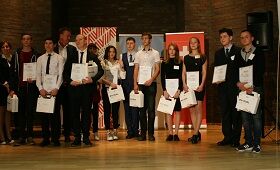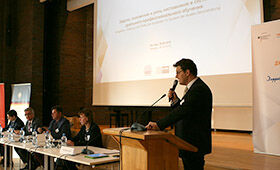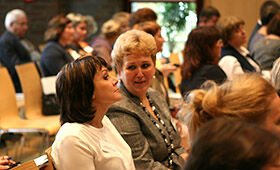The role of trainers – German-Russian conference in Moscow
More than 150 representatives from German and Russian companies and vocational education and training institutions held discussions on the status of the occupation of trainer. The debate was not merely confined to positive aspects.

A conference on the topic of “Tasks, position and role of trainers in the dual system of vocational education and training” took place at the German Embassy in Moscow on 26 September 2018. The event was jointly organised by the embassy’s Social Affairs Department and the Federal Institute for Vocational Education and Training (FIRP RANHIGS) in conjunction with the German Chamber of Commerce and Industry in Russia (AHK Moscow). More than 150 representatives from German and Russian companies, from vocational education and training institutions and from the education administration sector were invited to attend.

Divided into three blocks the experts discussed the relevant general legal conditions, socio-pedagogical challenges, and various models for the alignment of trainers at companies. The perspective of the German speaking countries was represented by Dr. Hannelore Kress from GOVET, Mr. Alexander Siegenthaler, Deputy Head of the Department of Business, Finance and Science at the Swiss Embassy in Moscow, and Mr. Rudolf Lukavsky, Head of the Trade Department of the Embassy of the Republic of Austria in Moscow.
During the conference particular attention was accorded to recruitment and motivation of trainers, to their needs and the requirements made of them, and to the field of initial and continuing training at companies. The exchange of views did not only cover the positive experiences of trainers in the education and work process; participants also debated the existing challenges and problems. The latter include a lack of legal consideration regarding the role of trainers, the low level of pay they receive for their work, and an absence of incentives on the part of companies and the state. Russian contributors from the field of trade and industry, from the vocational school system and from the area of education administration presented numerous educational projects and experiments demonstrating that models of dual VET in Russia are undergoing further development.

After the conclusion of the conference, Ms. Beate Grzeski, Deputy Ambassador at the German Embassy, invited participants to attend a special ceremony at which the German Chamber of Commerce and Industry in Russia (AHK Moscow) awarded honorary certificates to the best trainees in the VETnet project. Since 2014, the AHK Moscow has developed and implemented ten dual training programmes in seven regions of Russia as part of the VETnet project. 77 young people successfully completed one of these programmes in the 2017/18 school year. The best performing trainees received certificates at the special ceremony alongside their trainers and in the presence of the Chair of the AHK. The companies “Claas” and “Ikea” were welcomed as new project participants.
The second part of the conference took place on the premises of the Federal Institute for Vocational Education and Training on 27 September. Representatives from the Russian institutions networked with experts from the Federal Institute for Vocational Education and Training and DLR project providers to discuss the didactic aspects of dual VET and to exchange ideas on the possible further development of joint projects. Two issues that clearly emerged in the course of the discussions were the necessity for an establishment of the role of trainers in law and the need for mutual recognition of diplomas between Germany and Russia.